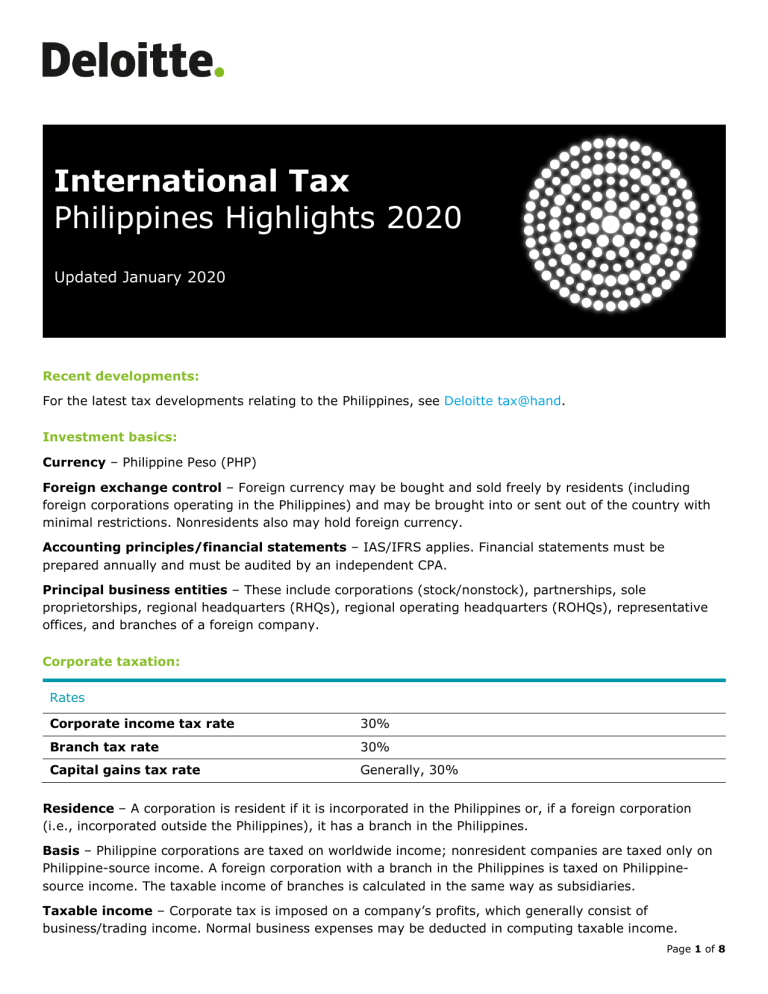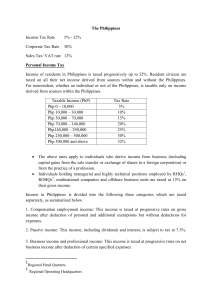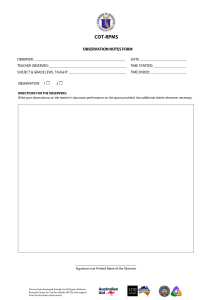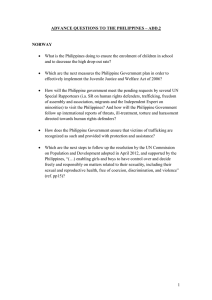
International Tax Philippines Highlights 2020 Updated January 2020 Recent developments: For the latest tax developments relating to the Philippines, see Deloitte tax@hand. Investment basics: Currency – Philippine Peso (PHP) Foreign exchange control – Foreign currency may be bought and sold freely by residents (including foreign corporations operating in the Philippines) and may be brought into or sent out of the country with minimal restrictions. Nonresidents also may hold foreign currency. Accounting principles/financial statements – IAS/IFRS applies. Financial statements must be prepared annually and must be audited by an independent CPA. Principal business entities – These include corporations (stock/nonstock), partnerships, sole proprietorships, regional headquarters (RHQs), regional operating headquarters (ROHQs), representative offices, and branches of a foreign company. Corporate taxation: Rates Corporate income tax rate 30% Branch tax rate 30% Capital gains tax rate Generally, 30% Residence – A corporation is resident if it is incorporated in the Philippines or, if a foreign corporation (i.e., incorporated outside the Philippines), it has a branch in the Philippines. Basis – Philippine corporations are taxed on worldwide income; nonresident companies are taxed only on Philippine-source income. A foreign corporation with a branch in the Philippines is taxed on Philippinesource income. The taxable income of branches is calculated in the same way as subsidiaries. Taxable income – Corporate tax is imposed on a company’s profits, which generally consist of business/trading income. Normal business expenses may be deducted in computing taxable income. Page 1 of 8 Philippines Highlights 2020 In lieu of itemized deductions, a domestic and resident corporation may elect to use the optional standard deduction (OSD), which may not exceed 40% of total gross income, in computing taxable income for the taxable quarter/year. Once a decision is made to use the OSD, it is irrevocable for the taxable year for which the return is filed. Rate – Philippine corporations generally are taxed at a rate of 30%. The rate for ROHQs is 10%. Surtax – A 10% surtax is imposed on improperly accumulated earnings. Alternative minimum tax – A minimum corporate income tax (MCIT) equal to 2% of gross income is imposed on both domestic and resident foreign corporations beginning in the fourth taxable year of operations. The MCIT is imposed in each quarter of the taxable year when a company has no or negative taxable income, or when the amount of the MCIT is greater than the corporation’s normal income tax liability. Any MCIT that exceeds the normal income tax may be carried forward and credited against the normal income tax for the following three taxable years. Taxation of dividends – Dividends received by Philippine domestic or resident foreign companies from a domestic corporation are not subject to tax. Capital gains – Capital gains generally are taxed as income. However, gains realized by a domestic corporation on the sale of shares in a domestic corporation that is not traded on the stock exchange are subject to a 15% capital gains tax. Such gains realized by a foreign corporation (including foreign corporations deemed resident in the Philippines through a branch) are subject to a 5% capital gains tax on the first PHP 100,000 and 10% on any excess. Gains on the sale of shares listed and traded on the stock exchange are taxed at 0.6% of the gross selling price. Gains derived from the sale of real property not used in a business are subject to a 6% final withholding tax based on the higher of the sales price or the fair market value. Losses – Losses may be carried forward for three years unless the taxpayer benefits from a tax incentive or an exemption. Losses may not be carried forward where the business undergoes a substantial change in ownership. The carryback of losses is not permitted. Foreign tax relief – Foreign tax paid by a domestic corporation may be credited proportionately against Philippine tax on the same profits, but the credit is limited to the amount of Philippine tax payable on the foreign income. Participation exemption – See “Taxation of dividends” above. Holding company regime – There is no holding company regime. Incentives – Incentives are provided under the Omnibus Investment Code of 1987 (administered by the Board of Investment) and the Special Economic Zone Act of 1995. Benefits usually include fiscal incentives (e.g., income tax holidays) and nonfiscal incentives (e.g., simplification of customs procedures for imports and exports). Enterprises engaged in specified business activities may be entitled to other incentives. Compliance for corporations: Tax year – The tax year may be a calendar year or a fiscal year (i.e., an accounting period of 12 months ending on the last day of any month other than December). Consolidated returns – A Philippine head office and its Philippine branches may file consolidated returns for corporate income tax and valued-added tax (VAT) purposes; otherwise, consolidated returns are not permitted and each company must file a separate return. Page 2 of 8 Philippines Highlights 2020 Filing and payment – The annual income tax return must be filed, with or without payment, on or before the 15th day of the fourth month following the close of the taxpayer’s taxable year. Penalties – Late payments are subject to a surcharge equal to 25% of the amount due plus interest of 12% per annum on the unpaid amount of tax until fully paid. A compromise penalty (in lieu of imprisonment) is imposed based on the tax due (exclusive of the 25% surcharge and applicable interest rate). Rulings – The tax authorities will issue a ruling on the tax consequences of a transaction at the request of a taxpayer. Individual taxation: Rates Individual income tax rate Capital gains tax rate Taxable income Rate Up to PHP 250,000 0% PHP 250,001 – PHP 400,000 20% of excess over PHP 250,000 PHP 400,001 – PHP 800,000 PHP 30,000 + 25% of excess over PHP 400,000 PHP 800,001 – PHP 2 million PHP 130,000 + 30% of excess over PHP 800,000 PHP 2 million – PHP 8 million PHP 490,000 + 32% of excess over PHP 2 million Over PHP 8 million PHP 2,410,000 +35% of excess over PHP 8 million Generally, individual income tax rates Residence – A citizen normally is considered a resident unless he/she meets the requirements to be deemed a nonresident. The residence status of a foreign employee generally is established when the aggregate length of stay in the country in any calendar year exceeds 180 days. If the foreign employee stays in the Philippines for more than 180 days, he/she is considered a nonresident alien engaged in a trade or business (NRA-ETB); otherwise, he/she is considered a nonresident alien not engaged in a trade or business (NRA-NETB). Basis – Resident citizens are taxed on worldwide income; resident aliens and nonresidents pay tax only on Philippine-source income. Foreign individuals may benefit from preferential tax treatment or may be exempt from income tax under an applicable tax treaty, subject to a confirmatory ruling from the Bureau of Internal Revenue (BIR). Taxable income – Taxable income is all income, less allowable deductions. It includes compensation, business income, capital gains (arising from the sale of real property and share transactions), dividends, interest, rents, royalties, annuities, pensions, and a partner’s distributive share of the net income of general professional partnerships. Page 3 of 8 Philippines Highlights 2020 Minimum wage earners are exempt from the payment of income tax on their compensation income, including holiday pay, overtime pay, night shift differential pay, and hazard pay. In lieu of itemized deductions, an individual engaged in business or the practice of a profession may elect to use the OSD, which may not exceed 40% of total gross sales/receipts, in computing taxable income for the taxable quarter/year. Once an election is made to use the OSD, it is irrevocable for the taxable year for which the return is made. Rates – Individual income tax is charged at progressive rates ranging from 0% to 35% (effective 1 January 2018 through 31 December 2022). However, self-employed individuals with gross sales of PHP 3 million and below and that are not required to be registered for VAT, have the option to pay 8% income tax based on gross income in excess of PHP 250,000 (in lieu of the graduated tax rates of 0% to 35% and the 3% percentage tax). Capital gains – Capital gains generally are subject to the ordinary income tax rates, although gains from the sale of certain shares and real property are subject to specific rates. An individual is subject to capital gains tax on the sale of real property at a rate of 6% of the higher of the gross sales price or the current fair market value. An individual also is subject to tax on the capital gains derived from the sale of shares not traded on the stock exchange at a rate of 15%. Gains derived from the sale of shares listed and traded on the stock exchange are taxed at 0.6% of the gross sales price. Deductions and allowances – Statutory contributions, as required by domestic laws, and nontaxable income (e.g., a nontaxable bonus amount of up to PHP 90,000 and de minimis benefits) are allowed as deductions and exclusions against an individual’s gross income. Foreign tax relief – Foreign tax paid by a domestic corporation may be credited proportionately against Philippine tax on the same profits, but the credit is limited to the amount of Philippine tax payable on the foreign income. Compliance for individuals: Tax year – The tax year is a calendar year. Filing status – Married couples in the Philippines who do not derive income only from compensation must file a joint income tax return. Filing and payment – Tax returns are due on or before 15 April after the close of the tax year. Tax on compensation income is withheld monthly by the employer. Individuals receiving compensation income from only one employer during the taxable year may qualify for “substituted” filing, provided the amount of tax due equals the amount of tax withheld by the employer at the end of the taxable calendar year. The same requirements must be met for married individuals to qualify for substituted filing. Penalties – Late payments are subject to a surcharge equal to 25% of the amount due and interest of 12% per annum based on the unpaid amount of tax until fully paid. A compromise penalty (in lieu of imprisonment) is imposed based on the tax due (exclusive of the 25% surcharge and applicable interest rate). Rulings – The tax authorities will issue a ruling on the tax consequences of a transaction at the request of a taxpayer. Page 4 of 8 Philippines Highlights 2020 Withholding tax: Rates Type of payment Residents Nonresidents Company Individual Company Individual Dividends 0% 10% 15%/30% 20%/25% Interest 7.5%/15%/20% 15%/20% 0%/20% 0%/20%/25% Royalties 20% 10%/20% 30% 10%/20%/25% Fees for technical services N/A N/A N/A N/A (treated as business profits unless recategorized as royalties) Dividends – Dividends distributed by a Philippine company to a nonresident foreign corporation are taxed at 30%, or the lower 15% tax rate if the country of the foreign corporate recipient allows a tax credit of 15%. The withholding tax may be reduced under an applicable tax treaty. Dividends distributed by a Philippine company to a resident individual are taxed at a rate of 10%, while those received by an NRA-ETB are taxed at 20% and NRA-NETB at 25%. Interest – Interest received by a nonresident foreign company is subject to a 20% withholding tax. Interest from Philippine currency deposits paid to a domestic company or resident foreign company is subject to a 20% withholding tax. Interest received by a resident individual or an NRA-ETB is subject to a 20% withholding tax, and for an NRA-NETB, the rate is 25%. Interest received from transactions with depository banks under the expanded foreign currency deposit system is subject to various withholding tax rates. The withholding tax rate is 15% on interest paid to domestic companies and resident individuals, and 7.5% for resident foreign companies. Nonresident foreign companies and individuals are exempt. Royalties – Royalty payments made to a domestic corporation and resident foreign corporation are subject to 20% withholding tax, and nonresident foreign corporations are subject to 30% withholding tax. A 20% final withholding tax is levied on royalty payments made to an individual, except for royalty payments from books, literary works, and musical compositions, which are taxed at 10%. However, a 25% withholding tax applies for any royalty payments made to an NRA-NETB. Fees for technical services – Technical service fees treated as business profits (rather than royalties) are subject to the applicable income tax rate (i.e., 30% for corporations and progressive rates of 0% to 35% for resident individuals and NRA-ETBs). If technical services fees are treated as royalties, then they are subject to the applicable withholding tax rules pertaining to royalties. Fees treated as royalties are also subject to final withholding VAT of 12%, unless specifically exempt under the law. Branch remittance tax – A 15% branch profits tax is levied on the after-tax profits remitted by a branch to its head office, except for profits on activities registered with the Philippine Economic Zone Authority. Other – Other payments to nonresidents may be subject to withholding tax (e.g., management fees at 30%; certain payments related to vessels at 4.5%; and aircraft, machinery, and other equipment at Page 5 of 8 Philippines Highlights 2020 7.5%). Rates may be reduced under a tax treaty, subject to a “confirmatory ruling” from the BIR or submission of a certificate of residence form (for tax treaty relief) in the case of dividends, interest, and royalties. Anti-avoidance rules: Transfer pricing – The transfer pricing rules, which are based on OECD guidelines, apply to both domestic and cross-border, related-party transactions. The following transfer pricing methods are permitted: comparable uncontrolled price method, resale price method, cost-plus method, profit split method, residual profit split approach, and transactional net margin method. Documentation requirements apply. Interest deduction limitations – The allowable deduction for interest expense will be reduced by an amount equal to 33% of the interest income that is subject to a final withholding tax. Controlled foreign companies – There are no controlled foreign company rules. Hybrids – There are no anti-hybrid rules. Economic substance requirements – There are no economic substance requirements. Disclosure requirements – There are no disclosure requirements. Exit tax – There is no exit tax. General anti-avoidance rule – There is no general anti-avoidance rule. Value added tax: Rates Standard rate 12% Reduced rate 0% Taxable transactions – VAT is imposed on most sales of goods and services. Rates – The sale and importation of certain goods and services are subject to 12% VAT. Certain sales are zero-rated or exempt. Registration – The registration threshold for VAT purposes is PHP 3 million. Filing and payment – The return/declaration may be filed either manually or through the Electronic Filing and Payment System (eFPS), no later than the 20th-25th day following the close of the month (for monthly returns) and no later than the 25th day following the close of each taxable quarter (for quarterly returns). Other taxes on corporations and individuals: Unless otherwise stated, the taxes in this section apply both to companies and individuals. Social security contributions – The employer must make monthly contributions to the social security system corresponding to the salaries of covered employees. The maximum monthly employer contribution for an employee in the highest salary bracket is PHP 1,630. An employee is required to make monthly contributions (ranging from PHP 80 to PHP 800) to the social security system based on his/her salary bracket. Page 6 of 8 Philippines Highlights 2020 Other mandatory contributions – In addition to social security contributions, the employer must make monthly contributions to the Philippine Health Insurance Corporation (PHIC) and Home Development Mutual Fund (HDMF) based on the salaries of covered employees. The maximum monthly employer contribution for an employee in the highest salary bracket is PHP 900 for PHIC and PHP 100 for HDMF. An employee is required to make monthly contributions (ranging from PHP 150 to PHP 900 for PHIC and PHP 100 (if monthly compensation is PHP 5,000 or more) for HDMF) based on his/her salary bracket. Payroll tax – There is no payroll tax. Capital duty – There is no capital duty. Real property tax – A property tax is imposed on real property at a rate that depends on the location of the property. The tax should not exceed 3% of the assessed value per the tax declaration. Transfer tax – Gratuitous transfers of property are subject to a donor’s tax at 6% of the fair market value of the property at the time of the donation. A local transfer tax on real property is levied at a rate of 0.50% to 0.75% on the higher of the gross sales price or the fair market value of the property upon the transfer or sale of the property. Stamp duty – Various rates of stamp duty apply, depending on the type of transaction/document. Net wealth/worth tax – There is no net wealth/worth tax. Inheritance/estate tax – A 6% tax is imposed on the net estate of both residents and nonresidents. Other – A “percentage tax” of 1% to 30% is imposed on certain types of businesses, such as banks, finance companies, insurance companies, and common carriers (except domestic carriers that transport passengers by air that are subject to VAT). Tax treaties: The Philippines has concluded approximately 43 tax treaties. The Philippines has not signed the OECD multilateral instrument. For information on the Philippines’ tax treaty network, visit Deloitte International Tax Source. Tax authorities: Bureau of Internal Revenue (national taxes); City/Municipal Treasurer’s Office (local taxes); Bureau of Customs Contact: Walter Abela, Jr. Senen Quizon (wabela@deloitte.com) (smquizon@deloitte.com) Page 7 of 8 Philippines Highlights 2020 Deloitte refers to one or more of Deloitte Touche Tohmatsu Limited (“DTTL”), its global network of member firms, and their related entities (collectively, the “Deloitte organization”). DTTL (also referred to as “Deloitte Global”) and each of its member firms and related entities are legally separate and independent entities, which cannot obligate or bind each other in respect of third parties. DTTL and each DTTL member firm and related entity is liable only for its own acts and omissions, and not those of each other. DTTL does not provide services to clients. Please see http://www.deloitte.com/about to learn more. Deloitte is a leading global provider of audit and assurance, consulting, financial advisory, risk advisory, tax and related services. Our global network of member firms and related entities in more than 150 countries and territories (collectively, the “Deloitte organization”) serves four out of five Fortune Global 500® companies. Learn how Deloitte’s approximately 312,000 people make an impact that matters at www.deloitte.com. This communication contains general information only, and none of Deloitte Touche Tohmatsu Limited (“DTTL”), its global network of member firms or their related entities (collectively, the “Deloitte organization”) is, by means of this communication, rendering professional advice or services. Before making any decision or taking any action that may affect your finances or your business, you should consult a qualified professional adviser. No representations, warranties or undertakings (express or implied) are given as to the accuracy or completeness of the information in this communication, and none of DTTL, its member firms, related entities, employees or agents shall be liable or responsible for any loss or damage whatsoever arising directly or indirectly in connection with any person relying on this communication. DTTL and each of its member firms, and their related entities, are legally separate and independent entities. © 2020. For information, contact Deloitte Global. Page 8 of 8




